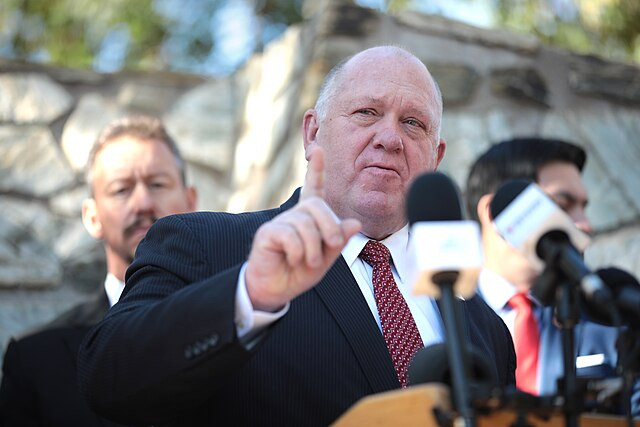Tom Homan, tapped as President-elect Donald Trump's border czar, is setting his sights on New York City's sanctuary policies and warning local officials of intensified federal enforcement if they do not cooperate. Homan, who served as acting director of Immigration and Customs Enforcement (ICE) under Trump, made it clear that his approach will be assertive, pledging to step up ICE operations in the city if needed. Speaking on Fox News' "Fox and Friends" Monday morning, Homan said, "If you're not going to help us, get the hell out of our way."
Homan's remarks come as tensions mount between federal immigration authorities and sanctuary cities like New York, where local laws limit law enforcement's cooperation with ICE. "If we can't get assistance from New York City, we may have to double the number of agents we send," Homan said, signaling that the incoming administration would not hesitate to take matters into its own hands. He emphasized the safety implications of the city's refusal to provide ICE access to jails like Rikers Island, stating, "It's much easier to arrest the bad guy in the jail. Give us access to Rikers Island that we've been kicked out of. Let us get the bad guy in jail."
Mayor Eric Adams has urged bipartisan efforts to address immigration reform, framing it as a pathway to better outcomes for the nation and immigrants seeking opportunity. "That is what's best for the American people, as well as the immigrants who come here, seeking the opportunity to build a better life and have a shot at the American Dream," Adams said. While expressing openness to dialogue, he reiterated that New York would remain a sanctuary city. A City Hall spokesperson confirmed that under current laws, the city would not disclose information about undocumented residents to federal authorities.
Homan has been vocal about his plans, which include expanding deportation efforts nationwide. "We're going to do the job with you or without you," he warned, referencing what he sees as gaps in public safety caused by local sanctuary laws. Homan has drawn attention for his hardline rhetoric, including previous comments about mass deportations. "What price do you put on our national security?" he asked in an interview with 60 Minutes when questioned about the cost of his approach.
The tension surrounding sanctuary policies has also drawn reactions from police unions and local law enforcement. NYPD Sergeants Benevolent Association President Vincent Vallelong criticized politicians for limiting collaboration, stating, "Police officers don't get the choice to pick and choose what crimes we enforce... Misguided politicians need to step back and allow every facet of law enforcement to work hand in hand." Patrick Hendry, president of the NYC Police Benevolent Association, echoed concerns about crime, stressing that undocumented individuals who commit crimes should be held accountable and deported. "We need our federal partners to continue to do their job to protect those who protect New Yorkers," Hendry said.
Homan's return to a prominent role in immigration enforcement marks a continuation of his controversial legacy. During his previous tenure at ICE, he oversaw the implementation of Trump's "zero tolerance" policy, which separated thousands of families at the border. Homan's appointment has reignited debates about the effectiveness and ethics of aggressive immigration enforcement. He remains unapologetic. "Families can be deported together," he told CBS's 60 Minutes, defending the measures as a means to curb illegal entry and address cartel-driven trafficking.
Critics, however, argue that Homan's rhetoric and tactics are divisive and harmful. Heidi Altman of the National Immigration Law Center accused him of conflating victims of trafficking with traffickers themselves. "Tom Homan is skilled at using public safety rhetoric to justify vicious tactics that tear families apart," she said.
Homan has positioned himself as a defender of law enforcement and national security, drawing on decades of experience in immigration. He started as a police officer in upstate New York before becoming a border patrol agent and eventually leading ICE. Alongside his enforcement efforts, he has championed initiatives like Border911 to educate the public on border security's importance, but his involvement with groups promoting hardline immigration stances has attracted scrutiny.






